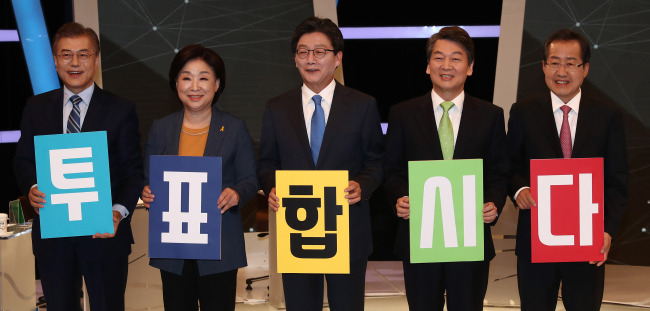South Korea’s presidential candidates may differ in their campaign pledges on defense, labor and political reform, but they appear to have one common ground -- spurring growth through the “digital economy.”
The digital economy, sometimes referred to as the “internet economy,” broadly refers to the economic activity that results from billions of everyday online connections among people, businesses, devices, data and processes, according to Deloitte.
This new type of economy is backed by the growing connections between people, organizations and machines via the internet and new mobile technologies, it said.
In a survey conducted by Korea’s Digital Economy Association, which consists of the country’s biggest internet technology industry business groups, all candidates -- except Hong Joon-pyo of the conservative Liberty Korea Party -- vowed to overhaul overregulation that hinders the growth of the IT-related sectors with differing governance plans. Hong did not provide a reply, the association said without elaborating.

From left, candidates Moon Jae-in of the main opposition Democratic Party of Korea, Sim Sang-jeung of the Justice Party, Yoo Seong-min of the splinter conservative Bareun Party, Ahn Cheol-soo of the centrist People’s Party and Hong Joon-pyo of the conservatice Liberty Korea Party. (Yonhap)
Front-runner Moon Jae-in of the main opposition Democratic Party of Korea vowed to reform Korea’s “outdated policies” that have weighed down domestic IT companies in competing against their bigger foreign rivals, which are not subject to such regulations.
Moon also called for the introduction of a so-called “negative regulation” system for the IT industry. Korea’s current “positive regulation” system acts like a whitelist, laying out what it permits, and in theory banning anything not covered.
A negative system acts like a blacklist, banning certain items. Using this approach new businesses or services are considered legal as long as they are not expressly banned.
In addition, Moon vowed to set aside bigger funds for startups and new business creation without citing specific figures. He will also open source the government’s public data to create a big data platform that new businesses can access and work with.
Among other plans, Moon also called for Korea’s early deployment of the ultra-fast 5G network, support for augmented reality and virtual reality technologies and the eradication of inefficient digital certificates and Active-X plug-in programs currently required for digital payments in Korea.
Ahn Cheol-soo of the centrist People's Party, Moon’s top rival and an IT expert who founded the nation’s leading anti-virus software company AhnLab, also proposed a negative regulation system and bolstered support for the progressive IT sector.
The former entrepreneur promised greater financial support for new-growth industries such as artificial intelligence, big data, cloud computing as well as virtual reality and augmented reality. Like Moon, Ahn also vowed to eradicate and replace security programs like Active-X security plug-ins that currently make online transactions difficult in Korea.
On the financial technology front, Ahn criticized the current government for having applied the same regulations governing traditional banks to Korea’s recently-launched internet banks, citing the need to reform policies to fit the new type of banks.
Meanwhile, Yoo Seong-min of the splinter conservative Bareun Party, laid out a plan for the creation of a new control tower that will oversee the country’s now-dispersed policies related to new technologies to improve regulatory efficiency.
Also a proponent of the negative regulation system, Yoo said he would push for new science and technology research and development spearheaded by industry players themselves with minimized government interference.
The veteran economist who has worked at the Korea Development Institute, the nation’s top economic think tank, also vowed to ease unnecessary regulations on personal information protection to help foster big data accumulation led by the private sector and new policies befitting the nature of internet banks, like Ahn.
On the other hand, Sim Sang-jeung of the minor progressive Justice Party stressed the need to deploy safety nets to offset the impact of the digital economic age, in addition to the impact of technological advancements.
Sim said the government must ensure that the digital economy brings benefits to citizens in terms of labor, education and welfare, in addition to enacting policies to revitalize the fast-moving new technology sector.
She called for policies to ensure that startups can get back on their feet and continue to innovate even after failure, while stressing the need for creative education and retraining programs for current workers.
The progressive candidate plans to form a new digital economy policymaking body directly under the president, which will invite industry officials, civic groups, academic circles and labor groups to partake in the decision-making process.
The conservative party’s Hong said he plans to form a 20 trillion won ($17.5 billion) investment fund over the next five years to nurture startups and build up Korea’s own big data system that benchmarks Singapore’s initiatives, during his campaign trail.
By Sohn Ji-young (jys@heraldcorp.com)



![[Herald Interview] 'Amid aging population, Korea to invite more young professionals from overseas'](http://res.heraldm.com/phpwas/restmb_idxmake.php?idx=645&simg=/content/image/2024/04/24/20240424050844_0.jpg&u=20240424200058)


